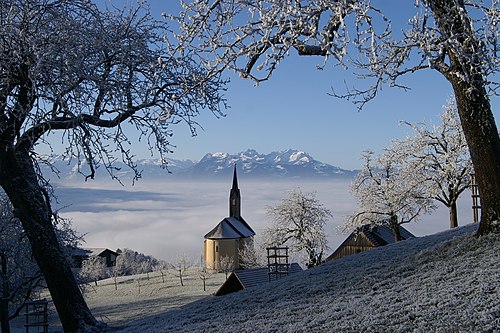Mistnoun
(uncountable) Water or other liquid finely suspended in air.
Mistnoun
(countable) A layer of fine droplets or particles.
Mistnoun
(figurative) Anything that dims or darkens, and obscures or intercepts vision.
Mistverb
To form mist.
Mistverb
To spray fine droplets on, particularly of water.
Mistverb
To cover with a mist.
Mistverb
(of the eyes) To be covered by tears.
Mistnoun
Visible watery vapor suspended in the atmosphere, at or near the surface of the earth; fog.
Mistnoun
Coarse, watery vapor, floating or falling in visible particles, approaching the form of rain; as, Scotch mist.
Mistnoun
Hence, anything which dims or darkens, and obscures or intercepts vision.
Mistverb
To cloud; to cover with mist; to dim.
Mistverb
To rain in very fine drops; as, it mists.
Mistnoun
a thin fog with condensation near the ground
Mistverb
become covered with mist;
Mistverb
make less visible or unclear;
Mistverb
spray finely or cover with mist
Mistnoun
a cloud of tiny water droplets suspended in the atmosphere at or near the earth's surface that limits visibility (to a lesser extent than fog; strictly, with visibility remaining above 1 km)
Mistnoun
a condensed vapour settling in fine droplets on a surface
Mistnoun
a haze or film over the eyes, especially caused by tears, and resulting in blurred vision
Mistnoun
used in reference to something that blurs one's perceptions or memory
Mistverb
cover or become covered with mist
Mistverb
(of a person's eyes) become covered with a film of tears causing blurred vision
Mistverb
spray (something, especially a plant) with a fine cloud of water droplets
Mist
Mist is a phenomenon caused by small droplets of water suspended in air. Physically, it is an example of a dispersion.
Steamnoun
The vapor formed when water changes from liquid phase to gas phase.
Steamnoun
Pressurized water vapour used for heating, cooking, or to provide mechanical energy.
Steamnoun
(figuratively) Internal energy for motive power.
Steamnoun
(figuratively) Pent-up anger.
Steamnoun
A steam-powered vehicle.
Steamnoun
Travel by means of a steam-powered vehicle.
Steamnoun
(obsolete) Any exhalation.
Steamnoun
(fencing) Fencing without the use of any electric equipment.
Steamverb
To cook with steam.
Steamverb
(transitive) To expose to the action of steam; to apply steam to for softening, dressing, or preparing.
Steamverb
(intransitive) To produce or vent steam.
Steamverb
(intransitive) To rise in vapour; to issue, or pass off, as vapour.
Steamverb
To become angry; to fume; to be incensed.
Steamverb
To make angry.
Steamverb
(intransitive) To be covered with condensed water vapor.
Steamverb
(intransitive) To travel by means of steam power.
Steamverb
To move with great or excessive purposefulness.
Steamverb
(obsolete) To exhale.
Steamadjective
Old-fashioned; from before the digital age.
Steamnoun
The elastic, aëriform fluid into which water is converted when heated to the boiling point; water in the state of vapor.
Steamnoun
The mist formed by condensed vapor; visible vapor; - so called in popular usage.
Steamnoun
Any exhalation.
Steamverb
To emit steam or vapor.
Steamverb
To rise in vapor; to issue, or pass off, as vapor.
Steamverb
To move or travel by the agency of steam.
Steamverb
To generate steam; as, the boiler steams well.
Steamverb
To exhale.
Steamverb
To expose to the action of steam; to apply steam to for softening, dressing, or preparing; as, to steam wood; to steamcloth; to steam food, etc.
Steamnoun
water at boiling temperature diffused in the atmosphere
Steamverb
travel by means of steam power;
Steamverb
emit steam;
Steamverb
rise as vapor
Steamverb
get very angry;
Steamverb
clean by means of steaming;
Steamverb
cook something by letting steam pass over it;
Steamnoun
the vapour into which water is converted when heated, forming a white mist of minute water droplets in the air
Steamnoun
the invisible gaseous form of water, formed by boiling, from which this vapour condenses.
Steamnoun
the expansive force of steam used as a source of power for machines
Steamnoun
locomotives and railway systems powered by steam
Steamnoun
energy and momentum or impetus
Steamverb
give off or produce steam
Steamverb
become or cause something to become covered or misted over with steam
Steamverb
cook (food) by heating it in steam from boiling water
Steamverb
(of food) cook by heating in steam
Steamverb
clean or otherwise treat with steam
Steamverb
apply steam to (something fixed with adhesive) so as to open or loosen it
Steamverb
(of a ship or train) travel somewhere under steam power
Steamverb
come, go, or move somewhere rapidly or in a forceful way
Steamverb
start or join a fight
Steamverb
(of a gang of thieves) move rapidly through a public place, stealing things or robbing people on the way
Steamverb
generate steam in and operate (a steam locomotive)
Steamverb
be or become extremely agitated or angry
Steam
Steam is water in the gas phase. This may occur due to evaporation or due to boiling, where heat is applied until water reaches the enthalpy of vaporization.



















